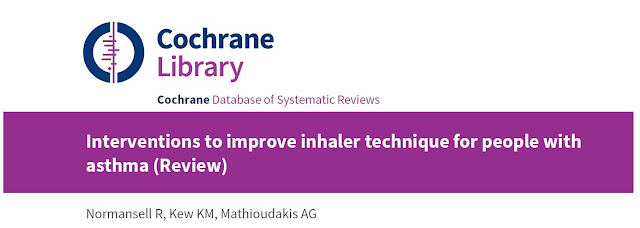Background to the question
Many asthma drugs are taken
by an inhaler, which deposits the drug directly into the lungs. It is
important that the inhaler is taken properly, so the patient gets the
most benefit. Taken properly, asthma drugs can improve symptoms and
reduce attacks.
Lots of people do not use their devices correctly.
This means that the drug is not delivered properly to the lungs, and as
a result, asthma may not be as well controlled as it should be. People
also tell us that they can have more than one type of inhaler, so it is
confusing to know what to do.
We wanted to find out whether
teaching people with asthma how to use their inhalers works, and whether
this leads to better control of symptoms and fewer attacks. It may seem
obvious, but it is important that doctors and nurses know how best to
help people with asthma.
Study characteristics
We
found 29 studies involving 2210 people with asthma. Studies lasted
between 2 and 26 weeks. Studies reported inhaler technique on a range of
different checklists.
We grouped studies into three types:
studies testing enhanced face-to-face training session(s), studies using
multi-media to deliver inhaler training (e.g. a video, computer app or
game) and studies testing devices that give people visual or audio
feedback about technique.
Studies tested different types of
training and used different measures to gauge success, meaning that we
could not bring data together. This was particularly true when we tried
to assess effects on asthma attacks, adverse events, visits to a
healthcare provider and absences from work or school.
Key results
Both
face-to-face and multi-media inhaler training improved inhaler
technique in most studies, although results varied depending on how and
when each technique was assessed.
Some studies reported the number
of people who had correct or 'good enough' technique. More people had
correct or 'good enough' technique after face-to-face training and with
feedback devices. But the benefit of multi-media training for adults was
uncertain.
Interventions that provide inhaler training may bring
some benefit for quality of life and asthma control among adults and
children, but results were varied and studies were small.
Children
may receive some benefit but results tended to be less clear for
children because fewer and smaller studies have included children as
participants.
Quality of the evidence
For studies
like these, it is not possible to blind people to their assigned group.
This may bias how people behave or respond to questionnaires, which
reduced our confidence in the findings. We were uncertain about other
results because studies did not provide enough data to show clear
benefit.
Conclusions
We cannot say for sure what is
the best way to help people learn how to use their inhaler properly. It
is important that patients understand how their inhaler works, so they
should ask their doctor or nurse for help.
We also use Cochrane
Reviews to make suggestions for future research. We suggest that trials
should last longer than six months and should report adherence
information. The most useful information reported was the number of
people who had 'good enough' inhaler technique, so we urge future trials
to report this as well.
Free full text link is


I started on COPD Herbal treatment from Ultimate Health Home, the treatment worked incredibly for my lungs condition. I used the herbal treatment for almost 4 months, it reversed my COPD. My severe shortness of breath, dry cough, chest tightness gradually disappeared. Reach Ultimate Health Home via their email at ultimatehealthhome@gmail.com . I can breath much better and It feels comfortable!
ReplyDeleteThiss is a great post
ReplyDelete